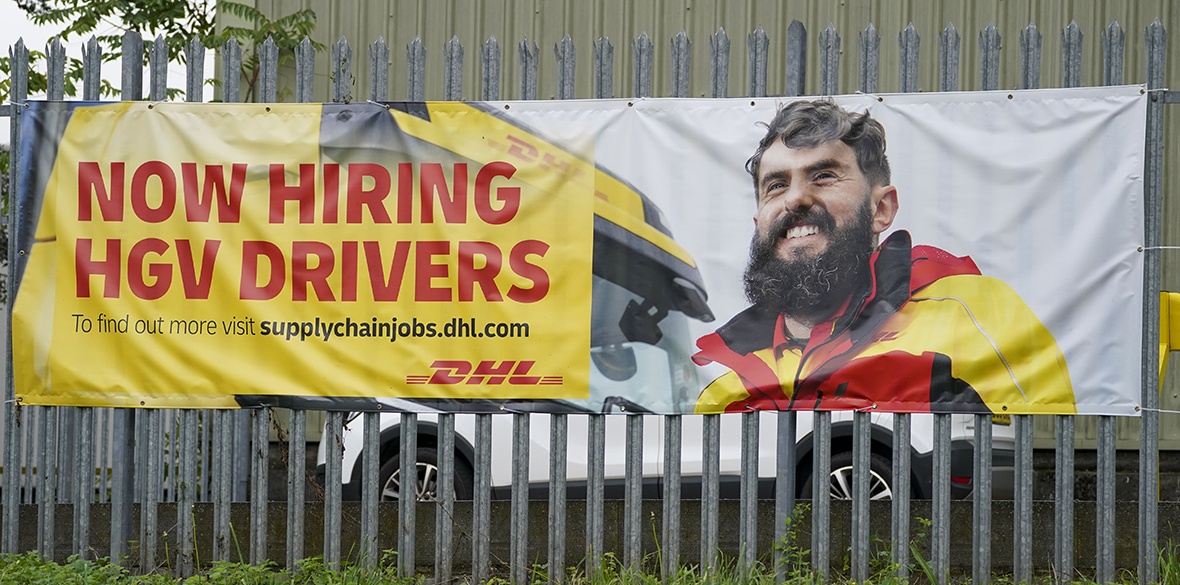This is the last article you can read this month
You can read more article this month
You can read more articles this month
Sorry your limit is up for this month
Reset on:
Please help support the Morning Star by subscribing here
TO say that truck drivers have been on our screens and in the news a lot lately is something of an understatement.
The distribution and logistics industry in the UK employs over two-and-half million people. Most of the time this huge army is completely invisible as we can always get everything we want.
I have always had a soft spot for truck drivers, probably because as a child I was enthralled by the Canadian TV series Cannonball. It was based on a trucking company running out of Toronto.
It ran on ATV in Britain and featured the adventures of Mike Malone (played by Paul Birch) as “Cannonball” and Jerry Austin (William Campbell), two truckers who hauled cargo across Canada and the US.
I was hooked as soon as I heard the theme tune, written and performed by the great country singer, Merle Haggard. We are all familiar with the truck driver being a key character in country music. There is even a sub-genre of the music called truck-driving country.
Combined with road music, this has created an almost mythical image of the truck driver in the US. These songs create an oral history of the trucking industry.
Almost every popular artist had to have a trucking song, from Willie Nelson to the Grateful Dead, Roger Miller to Asleep at the Wheel. This kind of romanticisation of the truck driver, however, has never really crossed the Atlantic.
It may have something to do with the more exotic-sounding names. Oklahoma City is indeed mighty pretty, and 24 hours from Tulsa sounds a lot more romantic than 24 hours from Tesco.
Although Route 66 is no longer the main cross-country route it once was, it still sounds a lot more exciting than the A66 from Middlesbrough to Workington.
Probably the greatest trucking song from this side of the Atlantic was Champion at Keeping ’em Rolling, by the great Ewan MacColl, released in 1956, with the great lyric: “Me liquor is diesel oil laced with strong tea.”
It has been covered by many artists including the Dubliners and my personal favourite, Bob Fox. The fact that this music is — let’s just say — getting on a bit, and this parallels what has been happening in the trucking business.
There were headlines in the newspapers saying “Lorry Driver Shortage Could Put Christmas Deliveries at Risk,” as far back as October 2015.
Thousands of older drivers are leaving the industry, shouted the Road Haulage Association.
The message was reinforced by the trade unions at the time that outsourcing and cutthroat competition between haulage businesses for logistics contracts had put huge pressure on drivers’ wages and conditions.
There was a shortage of up to 45 to 50,000 drivers, and that was six years ago.
There are huge variations between employers, but the bottom end of the industry exposed by Ken Loach in his 2019 film Sorry We Missed You, is particularly grim.
Today we hear about how this is all the fault of Brexit. There is no doubt that Brexit — or Covid, for that matter — has not helped.
Leaving the EU cabotage system, huge delays at ports and the loss of many EU drivers and their trucks from Britain has indeed contributed to the enormous pressure on the British trucking industry.
There has been a steady reduction over a decade of the number of businesses operating in the industry. These underlying weaknesses developed while we were inside the EU.
Increasing competition among retailers and logistics providers eroded profit margins and the pressure to reduce costs and increase productivity has been pressed down onto the workers.
The failure to encourage more diverse entrants to the industry, lack of training and support for new drivers, the appalling conditions many drivers face on the road, with lack of access to even basic things like toilets, have not just suddenly arisen.
We call them key workers and yet often they cannot even get the key to a toilet.
The great weakness in the industry is its industrial relations, and the hostile legal framework towards trade unions has been hugely regressive.
The key to improving pay and conditions is effective collective bargaining across the sector.
There needs to be an end to the over-reliance on temporary and agency workers. All the flexibility demanded by just-in-time systems and consumers has been passed down on to the shoulders of the workers in the industry.
This creates inconsistent and unpredictable working patterns which are a major health hazard.
Research from the University of Nottingham showing many workers were unable to speak out and faced “threatening and intimidating behaviour” in the workplace reinforces the key role that effective unions can have. I urge everyone to support Unite Drivers Manifesto.
When you consider the working conditions and huge responsibility drivers carry. it is astonishing that in 2020 the mediangross hourly rate of pay for an HGV driver was a mere £11.80.
Think about this when the government worries about wage inflation — a 10 per cent wage rise would be £1.18.
Let us be honest. A few work visas are not going to solve this problem.
This year the industry will lift over 1.3 billion tonnes of freight. Ensuring that freight gets to where it needs to get to be is in everyone’s interests.
A driver for Eddie Stobart may not be as romantic as Cannonball, but while we are waiting for these obvious improvements, how about bringing this hidden army of truck drivers into the light of our cultural spaces. Surely their lives, their challenges and loves are stories worthy of representation?











